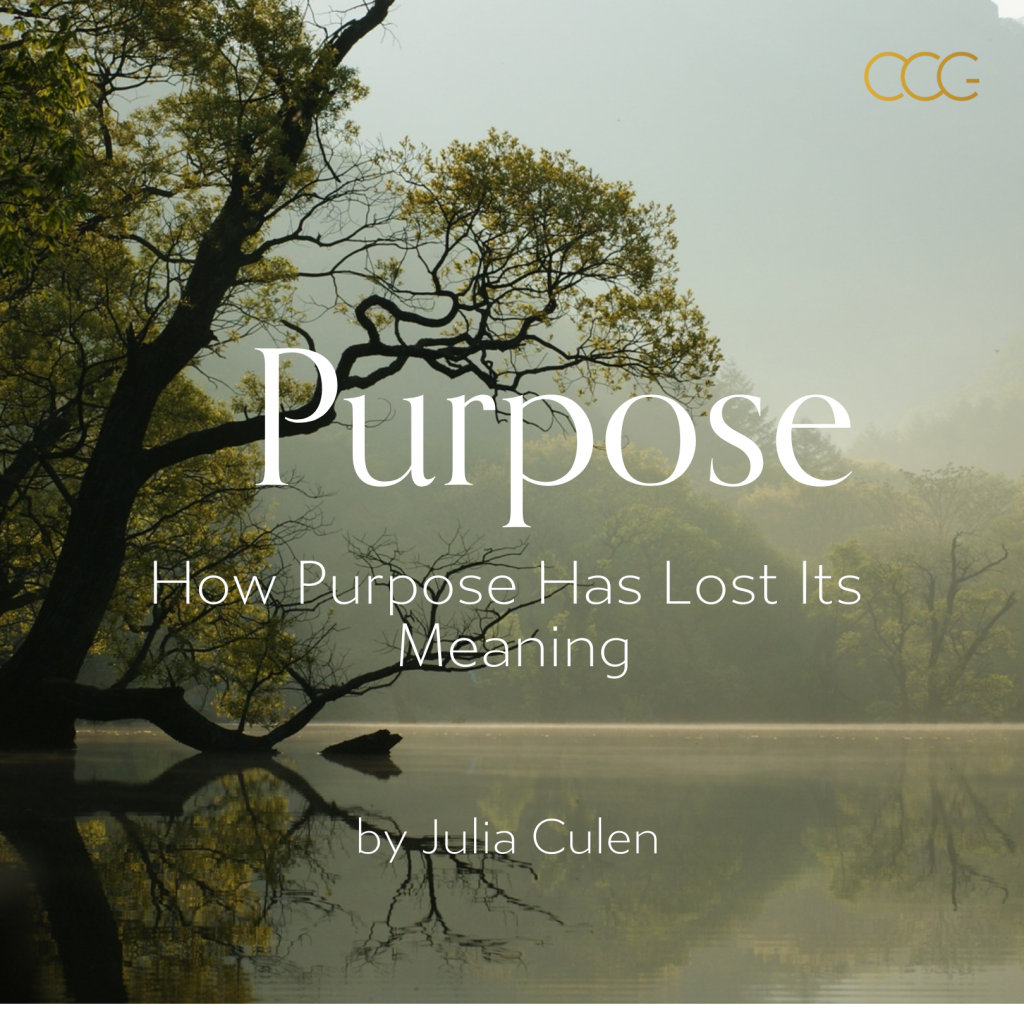
Another time a concept has incurred a similar fate as “mindfulness” and “agility.” Now we deal with purpose. From its status, which was hardly understood initially, it has made it into the mainstream.
Purpose now is a must-have – like a new accessory. Such this draft has fallen from its actually good and hopeful starting point into absolute banality. It has been integrated into the trinity of „Values, Mission, Vision“ and hence has become an empty phrase.
„Purpose driven“ in fact says everything already: Purpose is, what a corporation drives forward, its staff and hopefully also the financial record – with the pleasant feeling of doing something really meaningful. Anyone who finds no „purpose“, because there exists little, may simply invent a purpose. Which means pouring old wine into new wineskin and to sell the whole thing neatly internally as well as to the outside. The „Why“ actually differs in one point decisively from the „What“ and the „How“: It cannot get scrutinized and hence cannot be challenged. Purpose has no material dimension, but a mental-spiritual one and gets conveyed via language, images and stories.
Many companies have succeeded in this by creating a real gimmick: With this they don’t have to change anything in the first place in what they do and how they do it. They simply just tell a new story about why they do whatever they do.”
Taking a closer look we can identify five essential dynamics and repetitive patterns, which in variations arrive at the similar outcome – i.e. crippling transformatory concepts over and over again until they fit into the old narrative, until they stabilize the status quo instead of transforming it.
The first pattern is the deconstruction of a concept by ripping it out of its context. Lets take for example Mindfulness. Attentiveness in fact is one of the eight essential cultural practices in Buddhism (The Eightfold Path) and unfolds its potency through the embedding in the wisdom teachings and other spiritual exercises. Having been taken out of context, mindfulness has become in many cases a banal routine of concentration in order to boost efficiency.
Also the question about signification and function – the purpose – is a great philosophical issue in life and part of therpeutical concepts. Yet in this contex in the manner, corporations would understand purpose, nothing is left any more.
The second pattern is commercialization: Profound concepts are made into (consulting-) products. The temptation to transform trendy themes into products and to market them is strong. The consulting firm BCG for instance has founded with Brighthouse an own Purpose Consulting daughter. The business is booming. Purpose has become an item, which can be baught on the market. The more complex the consulting process gets, the more expensive is the service, while in fact the real potential lies in the simple processes, in simple questions and authentic answers.
The third pattern is utilization: To conceive a complex matter simply as a tool for achieving ones own goals. purpose gets understood as a mean to reach the companies objectives:
Employer Branding, Employee Satisfaction, Performance Culture, Power of Innovation – everything better thanks to purpose. Nothing condemnable with that. But only then, when the orientation towards a purpose actually would lead to innovative approaches and not just talking about purpose, would lead to a covering up existing weaknesses and to refurbish an old house just with a new coat of paint.

Pupose gets disposessed from all its spiritual and mental aspects. Whether it us mindfulness, agility or purpose – all those concepts are derived originally from deep-rooted processes of insight, partly from millennia-long wisdom traditions. Yet, as we need to materialize even spirituality – otherwise we would risk serious suspicion of esoterism – we have to erase those aspects.
It took great efforts to extract things like meditation and mindfulness out from their spiritual corner and take them into the secular-professional mainstream. Unfortunately the deeper dimension and transformatory potential of those concepts on the conscience level fell by the wayside.
The fifth pattern is egocentrism: With concepts like mindfulness and purpose the focus is permanently directed towards how could it serve one own optimization. The egocentrism is the paradigm, out of which the whole economic system and our society gets its nutriment from. We behave like small children who consider themselves the center of the world, unable yet to share and just look for satisfaction of their immediate necessities for survival, driven by the sense of isolation, privation and greed. Purpose is understood as a mere tool to foster ones own advantages. That leads towards a completely wrong direction.
It needs to rephrase the question. Away from: „How can I employ purpose to get a larger chunk of the cake ?“ towards „viewing the situation of the social and ecologic environment in which we are embedded, how can we contribute to a positive development in the conviction, that this exactly will also have a share in our own positive economic progress ? This means to employ an integrative perception, which does not lead into a mental either – or antagonism but towards a space of as well as, in other words, in a profit and purpose complex. It’s not the We-or-the-others but the
We-and-the-others. This is a space, in which a company sees itself immersed in its immediate environment, in which the responsibility for ones own behavior is not confined by ones own periphery. Because no company can exist without the rest of the world. Each enterprise is linked to the society and their services like infrastructure, education and financial systems. The interconnectedness of the world – physically, digitally, emotionally, mentally has reached a degree, which has led to a state, where everything affects everything.
To think globally means: We don’t deconstruct things and don’t mask parts of them – for instance damages of the environment, for which we would not pay directly yet would cause. Instead we, being adult people, imply the consequences of our deeds to the environment.
Getting back to purpose I would like to come up with an alternative procedure : Don’t start with the „Why“. Instead of trying to ornate the present „What“ and „How“ with a halfway conclusive and possibly grandiose „Why“ a corporation could – old as well as new ones – question, whether that, what they do and how they are doing it would contribute to the positive social and ecological development. Is this, what we produce, still contemporary ? Is the way still appropriate how we produce it ? Does it still suit the age of massive endangerment of the climate, rising inequality and re-regionalization ? What are our present capacities, core-services and products ? How can we reasonably advance them ? Which face-to-face encounter we would foster and which corporate culture we keep up and how does this account to our own well being – mentally, emotionally, economically ? Lets assume, our collective and overall purpose would be „to render a positive contribution to the development of the world“ or differently: give more than take: what would then be our particular purpose ?
If those questions would be answered – seriously and in depth – a lot of companies would get confronted with absolutely crucial changes in procedures, purchasing, management, production standards and many more. Companies of this new type combine social and ecological accountability, would work almost exclusively with recycled products and care about the circulation of goods. They cooperate with foundations and interconnect with the community, in which they live. Other firms would reduce their waste and energy consumption, raise their basic wages, offer an inclusive and open corporate culture. They do not initiate isolated projects, ripped out of context, instead get sustained yield and accordingly „regenerability“ will become their fundamentals.
They make good products and good profits and by the way attract the best talents. Such one does not need to search for purpose or need to invent it: It deducts itself automatically, is obvious and gets enlived genuinely – and makes the implicit explicit .
This article was originally written in German and was published in the January 2022 Edition of the German Leadership Magazine “managerSeminare”.
You can find the German article here
Special thanks go to my father Stefan Culen who translated the text into English.